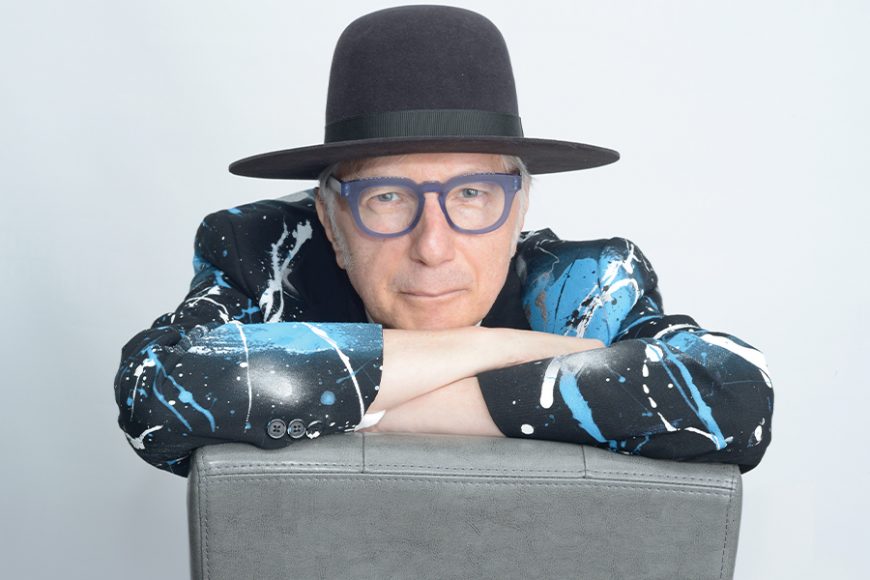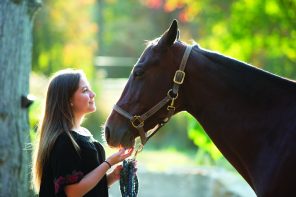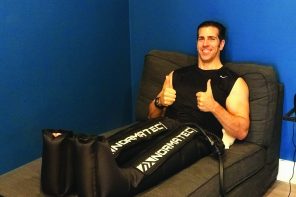“Time is all we have,” Nenad Bach says. “There are no other possessions. It’s the only commodity.”
He’s sitting in WAG’s White Plains office, dressed in a white, button-down shirt, black trousers and a black, broad-brimmed hat — all of which provide a backdrop for a spectacular jacket that looks like a galaxy. It is, in a way, a calling card for a career in popular music and the peace movement that has brought him together with everyone from Luciano Pavarotti to Bono.
But he’s not here to talk about his life as a composer, singer and guitarist — or at least not primarily. Over coffee and strudel, Bach — a gentle soul whose depth of wisdom and serenity belie an impish, twinkling wryness — explores what for him is the slowing of time.
“There’s a beauty in slowness,” he says. “I always wanted to slow down. Finally, my body said, ‘Enough.’”
In 2010, Bach, a Croton-on-Hudson resident, was diagnosed with Parkinson’s disease, a degenerative neurological disorder that affects the motor skills of more than 10 million people worldwide — 1 million of them Americans — with men 1½ times more likely to get it. About 60,000 cases are diagnosed annually in the United States alone. Parkinson’s — named for James Parkinson, the 19th-century surgeon, scientist and political activist who first identified it in a 1817 essay — is the second most common neurodegenerative disease behind Alzheimer’s.
Far from being devastated, Bach saw the diagnosis as a relief. “I thought it would be something much worse,” he says. “There’s a saying that you don’t die of Parkinson’s; you die with Parkinson’s.”
Still, the disease has made everyday tasks challenging and threatened his guitar playing as syncopated beats became difficult. Then friend Robert Fuhrer — the toy entrepreneur who lives in Chappaqua — invited him to play pingpong at the Westchester Table Tennis Center in Pleasantville, owned by Will Shortz, better known as the crossword puzzle editor of The New York Times. Immediately, Bach began to notice a difference. He played once a week, then three times a week. After six months, he returned to playing the guitar.
“The neuroplasticity is such that the brain is either repairing connections or making new ones,” says the musician, who comes from a family immersed in the biological and medical sciences.
So excited was Bach to share his improvement that he —
together with Shortz; Art Dubow, a psychiatrist who’s an avid table tennis player; and publicist Irene Silbert — formed Ping Pong Parkinson on March 1, 2017.
Medicine has long stressed the relationship between health and exercise, and the Parkinson’s Foundation is no exception. As its website notes: “For people with Parkinson’s disease (PD), exercise is more than healthy — it is a vital component to maintaining balance, mobility and activities of daily living. Exercise and physical activity can improve many PD symptoms.”
Adds David Russell — director of clinical research at the Institute for Neurodegenerative Disorders and assistant clinical professor of neurology and psychology at Yale University: “There’s strength and rhythm and coordination and balance — all involved, and so it is an intriguing idea that maybe pingpong would be a particularly productive kind of exercise for Parkinson’s. Additionally, it’s fun and that is important, because it will get people to play.”
Indeed, as Bach waits for WAG photographer Bob Rozycki to set up the photo shoot, he easily bounces a pingpong ball — again and again and again — on a paddle, juggling as well.
But there are limits to what Parkinson’s sufferers can do, including those that have nothing to do with the disease itself. Traveling the globe, Bach realized that those with Parkinson’s and other neurological challenges are excluded from the Paralympic Games. So from Oct. 11 through 13, he chaired the inaugural Parkinson’s World Table Tennis Championship at the Westchester Table Tennis Center — and performed live at the event.
Music has been part of Bach’s life since he was a child in Croatia and sat on his violin bow accidentally. The son of a professor of histology and biology and grandson of a surgeon, Bach studied violin from age 7 to 14 when “the rock ’n’ roll bug bit me,” he says. He sang and played the guitar, but composition was his forté.
“I wanted to express myself,” he says. “It just came out naturally.”
Nevertheless, he graduated from the University of Rijeka as a civil engineer, even though he formed a band, The Time and the Earth, in college. (The band’s self-named first album, released in 1980, would hit number one.)
By then, Bach had realized that engineering wasn’t for him. On Sept. 29, 1984, he arrived in New York for good.
“It still brings tears to my eyes,” he recalls. “(Immigration official) Linda Hartman said, ‘Welcome to the United States.’”
It’s a far cry from what many experience nowadays, but Bach sees America’s current immigration problem as less a question of ethnicity and more one of social class. His family made sure he was cultivated. Parents who struggle to put food on the table, he says, may not be able to ensure the same for their offspring.
In the States, Bach continued his education, studying English. His natural curiosity about everything from music to why a giraffe looks the way it does opened doors for him. He sat in on Columbia University School of the Arts’ film classes taught by directors Miloš Forman and Martin Scorsese. He met everyone from folk legend Richie Havens to Putnam Valley composer David Amram. He titled his first U.S. album — somewhat ironically and impudently — “Greatest Hits” (1987).
His music has always had an activist element to it. He performed his song “Can We Go Higher?,” a call for peace during the war in Croatia and Bosnia and Herzegovina co-written by John Timpane, at Woodstock ’94 and at the concert “Pavarotti & Friends,” held in 1995 in Pavarotti’s hometown of Modena, Italy. The song also appeared a year later on the album “Pavarotti & Friends for the Children of Bosnia” (and on Bach’s “A Thousand Years of Peace”). He has also created the World Peace in One Hour website to bring an end to global violence through the arts and technology.
Along with his family — wife Vjera, a pediatrician; son Ivo, a neurologist; and daughters Ana and Lea, a veterinarian and physician respectively — composition remains a great love. Most recently, he scored “Heroes Are Never Forgotten: A Peter Tomich Story,” a documentary about the chief water tender on the USS Utah, who died saving the lives of many fellow crewmembers during the Dec. 7, 1941 attack on Pearl Harbor and the retired rear admiral, James Lunney, who fought to present Tomich’s Congressional Medal of Honor to his descendants 65 years later.
Heroes are indeed never forgotten and no one who meets Bach will ever forget him.
For more, visit PingPongParkinson.com and worldpeaceinonehour.com.





